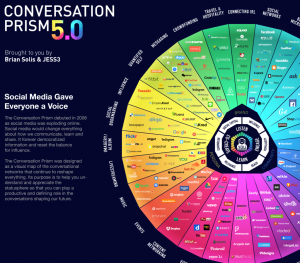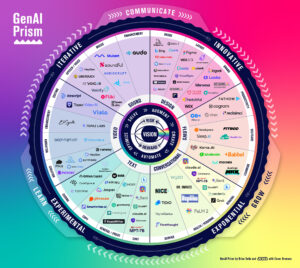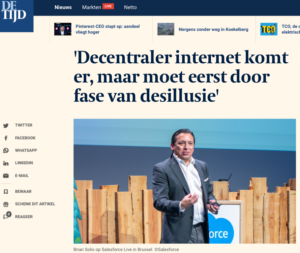
As we’ve learned time and time again, there is no “I” in team. Instead of focusing exclusively on “what’s in it for me,” we’re encouraged to contribute to the greater collective of groups in order to accomplish wonderful things – those usually unattainable by any one person.
Of course, this headline is a play on those words, but it also opens the door to an interesting conversation – one that explores a global network of connections weaved from both relations and relationships and bound through action and reaction.
I recently asked aloud who’s the me in social media as a way of escalating the discussion around the importance of what we do and say online and also what we don’t do or say and how these seemingly innocuous deeds contribute to the establishment of our Web identity.
Indeed, we cast digital shadows…
However, with all we know about social media, we are ambivalent to its possibilities and its perils. Instead, we are seduced by the capacity to channel our inner-celebrity and as such, we’re intoxicated by the responses and relationships we earn by willfully sharing in public what was once deemed and coveted as private. The allure of becoming Internet Famous is not necessarily the aspiration of those who engage in social networks, but it is something that manifests either intentionally or unintentionally, almost becoming our certification for tweeting, commenting, posting, and sharing.
Perhaps one of the most fascinating observations that I’ve documented and something that continues to receive a significant focus of my attention, is the idea that through social media, we are creating a global society of digital extroverts, rich with individuals who are gaining confidence online and ultimately offline, by saying and sharing the very things that they might not have otherwise voiced in real life.
It’s almost a form of healthy self expression, combined with validation and a touch of self-actualization…
I Tweet, therefore I am…
I pay attention to the work of Dan Zarrella, a friend of mine who is also a social scientist of sorts. Most recently, I analyzed and shared his work in which he dissected the behavior and defining characteristics of retweets.
His most recent study examines how social behavior affects relationships on Twitter and certain activities contribute to the state of those who follow us.
Even though an “I” is absent from team, a “me” readily apparent. I believe that as social media evolves and matures, we need to focus less on the “me” in social media and more on the “we” in the social Web.
Now we have the data to prove it…
Zarrella drew a parallel connection between social language and followers. Using inclusive words such as “you” and “we” usually ties to a greater number of followers.

Ultimately, it’s how we value and in turn, continually invest in relationships that define who we are in the long term. The net result is that accounts with a greater number of followers tended to use social language more frequently than those who focus on the “I” in Twitter.
Concurrently, Zarrella also surveyed the relationship between narcissism and connections.

Those who tend to talk about themselves also possess a propensity to repel legions of prospective followers.
Emotions also play a role in how individuals form and cultivate relationships. Zarrella documented that people who share updates that are rooted in negative sentiment, such as sadness, aggression, derogatory commentary, etc., will find it difficult to increase their audience and their connections.

Sometimes we need to realize that inner monologue is a gift worth embracing…
We each possess an inherent and unique ability to make decisions governed by a moral compass. These decisions are now challenged by real-time architectures that entice us to say what we think, before we think it through. What we publish online says more about us than we know or we may realize. In an era where common sense may prove uncommon, an updated form of social psychology is necessary to learn and consequently teach netizens how to create their own destiny, centered by a relevant and meaningful social compass.
In a recent discussion with Dr. Drew Pinksey, he advocated a deep understanding of the importance of relationships in the real world in order to foster and cultivate meaningful connections online.
As much of this is so new, we are literally learning as we go. We share what moves us with an audience of people we know, those we wish to know, and those who desire to know us. Part of acting of course, is reacting, and it’s through those reactions that we learn the rules of engagement as well as the content and activities that engender reactions.
In many ways, the “me” in social media contributes to a stage of participation that at first blush, resembles an ecosystem of vanity, or something that I refer to as the egosystem. But it is this egosystem that has empowered each one of us to construct something truly significant.
The true latency of social media lies in our ability to continually connect meaning and relevance over time. After all, we are all in this together. The ability to publish information nowadays is not our true opportunity to gain prominence. Recognition and reciprocity are among the strongest forms of currency in the social Web and as such, we are measured by our actions and our words.
Never forget to pay it forward, it’s how you got here and it defines where you’re going.
Connect with Brian Solis on Twitter, LinkedIn, Tumblr, Google Buzz, Facebook
—
Please consider reading my brand new book, Engage!
—
Get Putting the Public Back in Public Relations and The Conversation Prism:


—
Image Credit: Shutterstock







Brian,
I can't stress enough how much I agree with what you have here. I am constantly finding and being approached by people who are more interested in themselves and their self-promotion, rather than the community they can build around themselves, their product, or the services they're offering.
The engagement factor in Social Media and Social Networks simply lays in the NAME of these tools. Without the Social and without the Networking, everything available to us is just null!
The fact that you back it up with Dan's statistical and very elaborate information gives it the credibility it needs! I wish more start-ups and “Gurus” understood this!
Thanks Greg. Well said!
There is not much more to say than: Excellent Article!
Social behavior on social networks will be always determined by your personality. You cannot pretend be someone else or do it as others out there are doing it. It just doesn´t work! Being you is the key!
I loved your approach and I bet there is much more to ask and research about it so I recommend all readers to visit Startups.com and place their business related questions regarding this and other topics to get expert overviews.
I really needed this, thank you so much! Great article, re-tweeting.
Appreciate that, thank you…have a great day!
Not to be a hypocrite here. It is nice to earn something and help the community through awareness. I believe both can be achievable at the same time. A balance is always the best thing.
Rennel
Savannah GA Advertising
Albany GA Advertising
Once again, you nailed it.
Your work should be read before any new business is allowed to start Tweeting.
Daily I lean on my background in Psychology to guide my work in the Social Media sphere. The human factor and the level of engagement is the key to success.
The bullhorn is dying. Just not fast enough.
Excellent, as always.
Excellent. I think everyone should read this before leaping in to the Twitter-sphere.
I would really love to see Dan's work cross-analyzed with the size of the networks people bring with them into Twitter and a qualitative study of why people value what they do. I suspect the value of sharing of individual perspectives (the “I” content) will become more evident, once those factors are included.
It is an easy claim to make that engaging others by asking questions about others is a way to bring them into a community. It does not follow, though, that failing to emphasize the “We” is tantamount to depriving a network of value, which is often the conclusion these discussions tend to reach. I appreciate your comments near the end that do seem to value this “egosystem,” but I think we can go further by encouraging a mix of new and authentic information about people that can lead to stronger relationships.
Although Twitter is used for convenience, I can go elsewhere to get information about general news and communities. What I will not be able to Google, however, is the much-maligned detail about what a neighbor is having for breakfast. Similarly, interpreting the emotional data above as “don't be negative” (rather than “share with intention”) can deny ourselves a chance at authentic expression that can lead to dealing with whatever issue is causing it. Often, this is the kind of information that will allow me to engage with that person later in a meaningful way.
Thanks Brian – I really liked “Sometimes we need to realize that inner monologue is a gift worth embracing” it's what creates meaning and growth in the human spirit. As you say relationships and authenticity are primary. I think alot of people start out with ego then mature into the realisation that it's about human interaction.
Studying sociology has helped me appreciate the fascinating world of human behaviour hence my interest. So it's social wedia not social me, myselfea perhaps. Although i have be honest and say i do enjoy it when you respond to comments 🙂
Paying it forward?
You still owe someone a phone call for what one of your people wrote on a post about a professor. That's paying it forward, particularly to someone that's done more for social media than most of the people that talk about it.
As for the Me/I argument, when you put yourself first, you put clients second or third. It's not about me or I, but what's best for the client.
Very inspirational. Thanks for this elucidating your unique perspective on community engagement, relationship building, and the value of sharing. You are right, we are all learning the rules of engagement as we go. In our desire to be heard, we must be meaningful in our words and actions, especially if we seek to influence others into action.
I agree with what you are saying here. Just the other week had this discussion, it seems like people care more about the 'I' then the rest of the community they are in. However before the social media you had the same individuality or 'egosystem' and people were fighting for it. I believe it is still happening, just in a different way. In social media it is a bit different as people now care what others think of them and how many followers you have. We might all be selfish, but we still care how other see us, and we are being watched even more tnah before because of the online access.
I really agree with what you are saying here. Just the other week had this discussion, it seems like people care more about the 'I' then the rest of the community they are in. However before the social media you had the same individuality or 'egosystem' and people were fighting for it. I believe it is still happening, just in a different way. In social media it is a bit different as people now care what others think of them and how many followers you have. We might all be selfish, but we still care how other see us, and we are being watched even more tnah before because of the online access.
Solid post…a lot to think about here.
ME in Social Media, I hope not I would hate to be couped up all day. No you are right the the me in social media I like Dans work with regards retweeting telling someone to please retweet seems so simply it is counter-intuitive. Works just the same as call to action or is a call to action.
Seems like a more complete brand model, Chris Brogan had one that was simplier looking involving what he called spreadable media, I feel you need message spreaders to retweet you ground breaking content, your ground breaking brand message, your ground breakingness.
“Sometimes we need to realize that inner monologue is a gift worth embracing”. Best quote ever. I'm seriously considering having that put on a coffee mug.
Thanks for this post, Brian. Great wisdom verified with statistical information–be inclusive, be positive, think before you speak (tweet).
Brian,
Excellent post. People and companies that focus on themselves will be more pronounced. We will know who you're looking out for. Keep up the good work.
Tim
Ah very interesting point of view. I can say it was a perfect post which holds you from you start reading title till the end. And I really like the way you analyse the things and put relavant charts to explain it .I wish I could have your view. I am on twitter and some other social medias from so much time but never think like this.
fitflop
A lesson that we can learn from the article is that tweeters prefers tweet that contain positive emotions.
Great Article.Look forward for the next one.
Not to be a hypocrite here. It is nice to earn something and help the community through awareness. I believe both can be achievable at the same time. A balance is always the best thing.
Dennis Smith
Global Royalties
Royalties of the World
I agree… People and companies that focus on themselves will be more pronounced
Presidential Elections 2010
My blogs